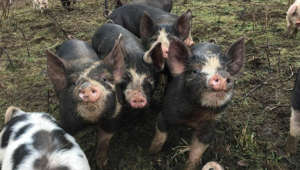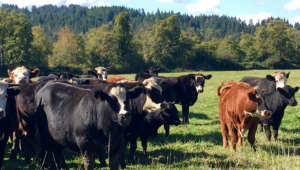What King Estate doesn’t grow or make on-site for our Restaurant we source from local farmers who share our values around quality and sustainability. Today we’ll meet two who took vastly different paths to arrive at our kitchen door: Pachamama Farm and Hawley Ranch. What brought these two producers – one a fifth-generation Oregonian, one a recent transplant from southern California – to the attention of Executive Chef Sean Winder? “It’s all about the integrity of the product,” Chef Sean says. “When sourcing is done right, you shouldn’t have to manipulate the product to disguise flaws or shortcomings. It’s not about creating something with the product, but letting the product shine through.”
The push to buy – and eat – local is older than Eugene’s Saturday Market (established 1970, in the rain), and it’s been part of the King Estate ethos since we opened our Restaurant in 2006. While the economic benefits of supporting local business – and agriculture in particular – have long been espoused, the health benefits have more recently entered our consciousness. Those benefits include the accountability that comes from knowing the people who grow your food and the confidence that comes from knowing how it was raised and harvested. When time and distance from field to plate is shorter, nutrients are preserved and carbon emissions reduced. Evidence aside, we just intuitively know that food grown ourselves or by a neighbor is better for us than food imported from a distant, unknown place.
The “eat local” movement picked up a catchy name – locavore – in 2005 when three San Francisco foodies issued a challenge to their fellow citizens to eat only foods grown within 100 miles of their home. The term caught on, along with growing awareness of the benefits of eating food grown close to home. Portlandia spoofed locavores in a memorable episode that took the trend to absurd levels, but as with most comedy there was a nugget of relatable truth embedded inside.
Let’s take a closer look at how King Estate’s partnership with two producers is helping the planet one plate at a time.

Pachamama Farm
Established 2016 by Michael Antoci, who sold a successful restaurant supply company in L.A. and resolved to go somewhere less dry and expensive.
Days Creek, Oregon, near Canyonville in Douglas County fit the bill. Mike named his 110-acre farm for the goddess known as the earth/time mother and who, in Incan mythology, presides over planting and harvesting. This “perfect piece of property” – with its own water source, streams and waterfalls, all surrounded by forestland – is where Mike raises his hogs for King Estate, along with sheep, lamb, goats, chickens and turkeys.
Mike’s approach to farming is the same as when he was in the fine dining business – with a focus on quality. Without hesitation he lists the ways his product is exceptional: “Heritage breed, grown slow, free in pasture, using sustainable local products.” The latter includes Umpqua ice cream (left over when production switches to new flavors) and Franz Bread that can’t be sold (when a customer cancels an order, for example). While the pigs find most of their food on their own in the forest, Mike supplements their bread-and-ice cream diet with fermented non-GMO barley and peas, which he describes as a pig probiotic superfood “These are happy pigs,” he says. Every morning Mike calls the pigs out of the forest using a special sound that, to the pigs’ ears, means breakfast. “They eat their special food, and then they go back to the forest to forage.”

Hawley Ranch
Established 1852, before Oregon was even a state, by Ira and Elvira Hawley.
Hawley Ranch has remained in family ownership for 165 years. For the past 40, the Hawleys’ great great grandson, Bill Hoyt, and his wife, Sharon Michael Hoyt, have run the sprawling cattle and sheep ranch that straddles both Lane and Douglas counties with headquarters in Cottage Grove, Oregon.
Bill and Sharon run their business the old-fashioned way, with an emphasis on personal relationships and truth in advertising. They sell directly to their customers, essentially serving as their own distributor, and they are careful not to overstate their products’ virtues or make claims they can’t back up.
“No added hormones means no added hormones ever, not just in the last 90 days,” Bill says. “Grass-fed means grass-fed over its entire life, not just 75% of its life.” He adds that grass-fed is something of a misnomer; the more accurate term might be forage-fed. Clover, legumes and vetch combined with grasses give the animal a high-protein diet that is more balanced in nutrients.
“There’s a lot of similarity between producing wine and meat,” Bill muses. “Like wine, ranching starts with the soil. We take a holistic approach. If it’s healthy for the animal, it’s healthy for the soil, too.”
The Hoyts have seen plenty of changes over the years, but don’t expect them to yearn nostalgically for the good old days. From vaccines and genetic testing to equipment and farming technology, the industry continues to advance while the basics – paying attention to the land, the animals and the customer – remain the same. Even something as simple as the advent of the all-terrain vehicle means that the ranchers can accomplish three times as much as they could 20 years ago, when everything was done by horseback. As a result of decades of experience, the whole ranch experience – from breeding to branding to handling – is less stressful for the animals and people alike. “A calm animal that is at peace with the environment and the people that are handling it is going to grow better,” Bill says, noting that every single animal on their ranch is cared for individually.
The Hoyts remain optimistic about the future of their brand of ranching. “I think people will always value where their food comes from,” Bill says. “They will always value the honesty and integrity of knowing that they can trust who they’re buying their food from, and I think that is going to keep us in business for a long time.”
